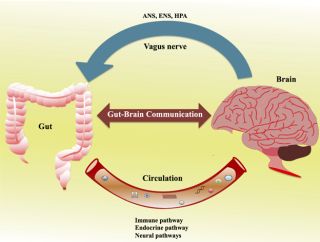Learn about brain health and nootropics to boost brain function
A Healthy Gut Might Mean a Happy Brain

Cognitive and emotional centers in the brain are linked in two-way communication with our gut via the gut-brain axis (GBA).
Decreased diversity in the microbiome is associated with physical and psychological dysfunction.
Researchers found that the diversity of bacteria in the gut biome negatively correlated with using suppression as an emotion regulation strategy.
Suganya, Kanmani, and Byung-Soo Koo, CC BY 4.0 via Wikimedia Commons Have you ever had a “gut feeling,” an intuition based on something other than logic and reason, perhaps based on emotion? The phrase “gut feeling” became an idiomatic expression because most people report that they literally feel it in their gut. In fact, the cognitive and emotional centers in the brain are linked in two-way communication with our gut via what researchers call the “ gut-brain axis ” (GBA) (Carabotti et al., 2015). The figure in this post shows this GBA and how the brain and gut can influence one another.
Each of us has a unique microbiome , defined as the community of microorganisms that live either in us (our intestines) or on our skin. Some of these bacteria have beneficial effects on our bodies and minds. Others are associated with inflammation and disease. Both types of bacteria play an important role in our physical health and psychological well-being. We can influence the composition of the microbiome community through our diet and dietary supplements like “probiotics.”
A probiotic is a food or a supplement that contains bacteria and yeasts that help the body maintain a healthy and diverse gut microorganism community. The Gut Microbiome and Our Immune System
Decreased diversity in the microbiome is associated with physical and psychological dysfunction. Researchers estimate that 70 to 80 percent of our immune system resides in the gut, meaning that microorganisms that live in the gut are in contact with, and can influence, the immune system all the time. Rachelshoemaker, CC BY-SA 4.0 via Wikimedia Commons There is a link between gut dysbiosis (an imbalance in the composition of the bacteria or a lack of diversity in that community of microorganisms) and physical problems such as diabetes, colorectal cancer, Crohn’s disease, ulcerative colitis, and Celiac disease (Lozupone et al., 2012), as well as mental health problems like depression and anxiety (Shoubridge et al., 2022).
Research suggests that there might be a link between the well-known variability in response to antidepressant drug treatment with drugs like SSRIs (SSRI medication does not effectively treat as many as a third of depressed individuals) and the effects of these drugs on the community of bacteria in the gut. Researchers are now exploring the possibility that knowledge of the gut microbiome might help predict who will benefit from a specific drug treatment.
article continues after advertisement Gut Feelings and Emotional Coping Strategies
Ke et al. (2022) found a link between positive and negative emotions and the gut biome and an association between the diversity of the biome, and two cognitive coping strategies we might employ to help regulate our emotional responses.
These researchers asked a large sample of women (n = 206) who were already taking part in another, larger study to complete a series of surveys measuring their emotional responses, positive (feeling happy and hopeful about the future) and negative (feeling sad, hopeless, or lonely ). They also asked how the women coped with their emotional responses.
The researchers were particularly interested in how the women used cognitive reappraisal, a coping strategy involving changing one’s assessment of the emotion-provoking situation, or suppression (inhibiting behaviors) associated with emotion like laughing or crying or keeping information about one’s emotional responses from other people. Cognitive reappraisal is a healthy response, while suppression is generally maladaptive and is associated with increased inflammation levels and stress . The participants completed the surveys twice, one year apart. They also collected stool samples four times in the period between surveys.
They found that the diversity of bacteria in the gut biome negatively correlated with using suppression as an emotion regulation strategy. As suppression used as a coping strategy increased, gut biome diversity decreased. Happier, more positive emotions were associated with lower levels of bacteria previously reported to be linked with markers of ill health like increased inflammation and impaired insulin sensitivity. More negative emotions were associated with higher levels of these bacteria.
Our gut feelings may well provide important information about our psychological and physical health that can help doctors design effective treatment plans.
article continues after advertisement
References
Carabotti, M., Scirocco, A., Maselli, M.A., and Severi, C. (2015). The gut-brain axis: Interactions between enteric microbiota, central and enteric nervous systems. Annals of Gastroenterology, 28 (2), 203- 209.
Lozupone, C.A., Stombaugh, J.I., Gordon, J.I., Jansson, J.K., and Knight, R. (2012). Diversity, stability and resilience of the human gut microbiota, Nature, 489 (7415), 229-230.
Shoubridge, A.P., Choo, J.M., Martin, A.M., Keating, D.J., Wong, M-L., Licinio, J., and Rogers, G.B. (2022). The gut microbiome and mental health: Advances in research and emerging priorities. Molecular Psychiatry , 27 , 1908-1919.
Ke, S., Guimond, A-J., Tworoger, S.S., Huang, T., Chan, A.T., Liu, Y-Y., and Kubzansky, L.D. (2023). Gut feelings: Associations of emotions and emotion regulation with the gut microbiome in women. Psychological Medicine , 10.1101/2022.05.26.493641
Read more at www.psychologytoday.com